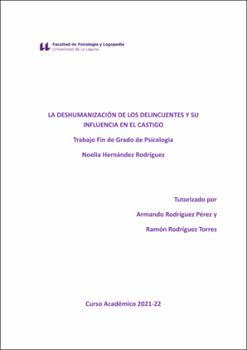La deshumanización de los delincuentes y su influencia en el castigo
Author
Hernández Rodríguez, NoeliaDate
2022Abstract
El objetivo de esta investigación fue comprobar si la deshumanización y los
estereotipos predicen mejor el castigo en distintos tipos de delincuentes que la gravedad de
los delitos. 90 personas respondieron a un cuestionario que evaluaba los estereotipos, de
acuerdo al Modelo de Contenido del Estereotipo, la deshumanización, la gravedad y el
castigo que se aplicaría a diferentes grupos: delincuentes que hayan cometido una agresión
sexual, física o un homicidio involuntario. Los resultados muestran que los agresores
sexuales y físicos son considerados menos morales y sociables y son más castigados que los
homicidas involuntarios. Por otro lado, la deshumanización y los estereotipos predecían el
castigo solo en el caso de los delincuentes físicos. Los resultados se discuten de acuerdo a las
teorías sobre deshumanización, estereotipo y castigo. The main objective of this investigation was to test if dehumanization and stereotype
predict better the punishment for different offenders types than the seriousness of the felony.
90 people answered a questionnaire that measured stereotype, acording to the Stereotype
Content Model, dehumanization, severity of the felony and the punishment applied to
different groups: people who have committed a sexual assault, physical agression or
involuntary manslaughter. Results show that sex and physical offenders are considered less
moral and sociable and are more punished than an unintentional killer. Furthermore,
dehumanization and stereotype predict better punishment, just in the case of physical
offenders. Results are discussed based on dehumanization, stereotype and punishment
theories.





